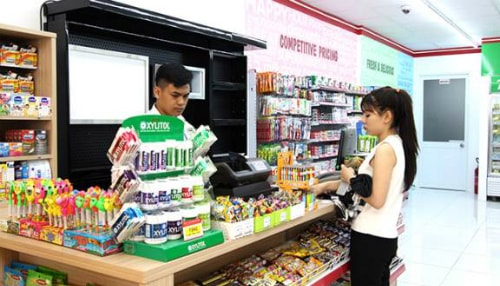Convenience store wars
Considered a long-term battle, not easy to make profits early, but the number of convenience store chains in Vietnam is still constantly increasing.
Planning to set foot in the market at the end of this year, the Korean brand GS25 is making the market “excited” when it announced that it will open its first store in Ho Chi Minh City and more than 2,500 stores within the next 10 years. This is one of the largest convenience store chains in Korea, accounting for about 30% of the retail market in this country.
Not wanting to stay out of the race, the famous Japanese retail brand 7-Eleven has entered Vietnam since the middle of this year and has now opened 7 stores in Ho Chi Minh City. The goal of this chain of stores is to introduce its own branded products and attract customers with affordable lunches. If successful, the Japanese brand will open 100 more stores in 3 years and 1,000 stores after 10 years of operation in Vietnam.
 |
The number of convenience stores is increasing rapidly. |
In addition to the famous brands, recently the market has seen a "new breeze" - the Toromart automatic vending system, appearing for the first time in Vietnam, invested by an American Vietnamese returning to Vietnam. All buying and selling operations are performed directly on the automatic machine, customers only need to scan the QR code on the accompanying application to pay for the product, no need to use cash.
Mr. Nguyen Xuan Quang, Head of the store's management department, said that the store will initially sell drinks, milk, and snacks. Next month, it will sell fruit and food products. In addition, the company said it has signed a cooperation agreement with a Vietnamese instant noodle company to sell instant noodles. Accordingly, there will be a system of self-mixing noodle machines to serve customers. The store will initially be widely deployed in Ho Chi Minh City, then spread to Vinh City. It is expected that by the end of 2018, the company will open 200 stores.
Entering the Vietnamese market very early, other foreign enterprises such as FamilyMart (Japan), Ministop - a subsidiary of AEON Group (Japan), Circle K (USA), Shop & Go (Singapore) have also continuously expanded their systems and formed large chains of stores. Of which, Circle K has up to 250 stores, Shop & Go has over 108 stores...
Under pressure from foreign investors, domestic enterprises have also transformed, changed their business methods, and continuously expanded their chains, of which Vingroup is the strongest. After nearly 2 years of building and developing the system, by early March, the VinMart+ system had 900 locations nationwide. It is expected that by the end of 2017, the total number of stores in operation will reach 1,500. Saigon Co.op's Co.op Food also has more than 181 stores in addition to 71 Co.opSmile stores (a new convenience store model) and aims to have 10 more stores in each system by the end of the year. As for Satra, this unit also aims to increase the number of stores to hundreds in the near future.
In general, convenience store systems in Vietnam are competing to grow. Although very few systems report profits, the expansion war has not stopped. According to retailers, this model is still less competitive than supermarkets and traditional stores because the selling price of goods is more expensive and there is less variety. However, they believe that this is the trend of the market, if any unit stands firm, it will achieve many "sweet fruits", otherwise it will have to give way to stronger competitors.
FamilyMart leaders said that the convenience store model requires long-term investment. In the Chinese market, it takes them 17 years to make a profit, and in Thailand and Korea, it takes up to 8 years. However, in Vietnam, this is an attractive destination, and the general investment cost is also lower than in other Southeast Asian countries. Therefore, in this market, FamilyMart expects to make a profit by 2019.
According to the 2016 Global Retail Development Index (GDI), ATKearney ranked Vietnam 6th in the world in terms of retail development index, up 5 places compared to 2015. The report also affirmed that convenience stores and mini supermarkets in Vietnam are two very "hot" developing sectors.
Also realizing that the number of convenience stores is growing rapidly, Mr. Vu Vinh Phu, former Chairman of the Hanoi Supermarket Association, said that the retail "land" is still wide open, because the modern group only accounts for 25% of the market share. The trend of fast, convenient consumption is increasingly welcomed by consumers, they like to shop in places near home, instead of having to go to large supermarkets that are far away. If they grasp this trend well and master the "playing field", retailers will have an advantage in negotiating prices with manufacturers, negotiating debts and even negotiating the commission level they want. Therefore, although they are suffering losses, they still try to expand to gain an advantage. Especially with foreign investors, they are willing to use profits gained in other markets to offset their investments in Vietnam.
According to ATKearney research, Vietnam is considered a country with a population age that is very suitable for convenience store chains, with 57% of the population under 35 years old. Therefore, in the coming time, there will be many more foreign retailers attacking the Vietnamese market.
According to VNE
| RELATED NEWS |
|---|

